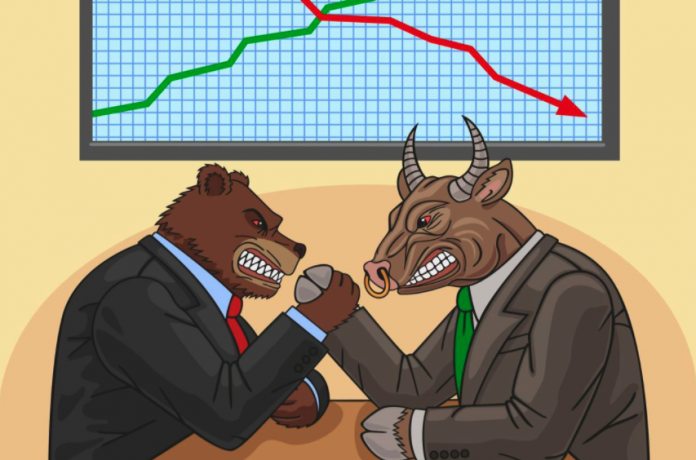Following an article yesterday, we have seen the Federal Reserve raise the fund rate by 25 basis points. This article will serve as some background for what is to come, through a transcription of an interview with the world-renowned strategist David Rosenberg and MarketWatch’s own Jonathan Burton. Let’s dive in:
Increasing interest rates, the US central bank’s primary tool for controlling inflationary pressures, is a blunt weapon at best, and Fed Chairman Jerome Powell has been hesitant to reach for it, much less wield it, until now. After the long-waited announcement came out that the fed will raise rates, stocks trended upwards in mid-day trading. As of writing this article, the S&P500 is up 2.5% and the NASDAQ is up 3.77%, with the majority of the markets showing likeness.
Phil Blancato, Chief Market Strategist for Advisor Group, said on FoxBusiness today, “come on, 25 basis points against 8% inflation…this is what the market wanted.” And he’s right. Let’s be honest. The Fed is so behind on this, that it doesn’t really affect anything, in a larger picture at least. Gary Kaltbaum, the president of Kaltbaum Capital Management, said in a piggyback to Blancato,
I don’t think Jpow and the fed even matter at this point in time…I think he has taken himself and the fed off the playing field…they are so far behind. They move up a quarter-point, down a half-point, up half, and down a quarter. They just don’t matter so far.”
Kaltbaum makes a good point as this move from the Fed doesn’t really impact many moving parts. As the War in Ukraine wages on, most eyes are on oil prices as they have now done a full round trip, going from $90/brl to $130/brl and back down to low 90s today. Sure, the short term is still dicey (again, because of literal war). But historically, years that have multiple rate hikes tend to do well, economically speaking. That is the general reaction from the markets and economists around the country. This position we are all in could easily change one way or the other very quickly. If peace comes in Ukraine soon, we will most likely see the economy start to pick up, and the Fed can continue to take a back seat. Now obviously this is speculative like most things are. Inflation isn’t just because of war. Questionable policy decisions out of DC and the lingering sting of Covid is also a contributor. The optimists of the country know a strong comeback can be made but needs to be methodical.
However, one of the world’s leading strategists has a gloomier outlook going forward. While today’s hikes may not have been much, considering the geo-political climate we are in, they are still relevant. And Rosenberg, the widely followed president and chief economist and strategist of Toronto-based Rosenberg Research & Associates Inc., is convinced that the Fed will beat inflation so hard that the U.S. economy will slide into recession as early as this summer.
It took two painful recessions, in 1981 and 1982, for then-Fed Chairman Paul Volcker — the patron saint of inflation fighters and Powell’s role model — to bury a decade’s worth of inflation and resurrect the U.S. economy and stock market. Rate increases due indeed suppress demand. But if taken too far, can cause the economy to be crushed. This is where I lead into the transcription of the previously mentioned interview with Rosenberg. Unsurprisingly, Rosenberg’s economic and market outlook is not popularly shared at the moment. But as he likes to say: “Forewarned is forearmed.”
Rosenberg: The timing came from Federal Reserve Chairman Jerome Powell. A couple of weeks ago, Powell said [former Fed Chairman] Paul Volcker was the “greatest public servant.” That’s all you have to hear. How did this greatest of them all kill inflation? Through back-to-back recessions in the early 1980s. Volcker is credited for ushering in a secular two-decade-long bull market and economic expansion, but only by destroying inflation through back-to-back recessions.
It would be wonderful if the Fed was adept at growing food and pumping oil and resurrecting broken supply chains, but the only way the Fed will be able to curb the cost-push inflation we have right now is through a recession. It’s going to take demand destruction to get inflation down.
MarketWatch: “Demand destruction” means bursting asset bubbles and that typically means lower valuations for housing, stocks, and other cherished investments. You’re on record about residential real estate being at “peak housing.” What convinces you that the U.S. housing sector is in a bubble?
Rosenberg: The housing market is in at least as big a bubble as the stock market. When you look at price action, it’s absolutely incredible. The year-over-year trend in nationwide home prices is 19%. We’ve already taken out prior bubble peaks in the late 1970s, mid-’80s, and mid-2000s.
Relative to overall inflation, housing is overvalued by 35%, and 27% relative to wages. Home prices relative to residential rents are 25% overvalued by the standards of the past. A single-family home now absorbs more than eight years of Americans’ personal income, which is almost 50% higher than the average going back to 1968. In a normal market it takes five years of income to buy a single-family home.
MarketWatch: How hard could this next recession hit U.S. home owners?
Rosenberg: Historically, home prices go up one- to two percentage points above the inflation rate. Right now it’s going up 12 percentage points. Residential real estate is a great hedge against inflation. But the excess is practically unprecedented. The laws of mean reversion are telling you that we’re going to have anywhere from a 20% to 30% bear market in residential real estate, and that’s being charitable. And once again, nobody seems to believe it, let alone prepare for it.
What ultimately pulls the rug out from under the housing market is the Fed, because housing is the most interest-rate-sensitive segment of the economy. Each Fed-induced pricking of the real-estate bubbles also played a big role in the eventual recession when you consider the importance of this sector and its multiplier effect on the broader economy. You can’t think that housing is going to respond to a rising rate cycle in the same way it responded to a declining rate cycle.
MarketWatch: You often say “forewarned is forearmed.” If what you predict plays out, it seems the Fed will have missed that warning. But investors can still heed it.
Rosenberg: We are living through an epic period in financial and economic history. We had a global pandemic, which nobody was prepared for. We had irresponsible fiscal largesse with gigantic tax cuts at a time of full employment in the last administration that left a lot of the cupboard bare for fiscal policy.
Then we had the Fed coming into this crisis with the funds rate at 1.75%. Normally the Fed cuts rates five percentage points in a recession; they didn’t have that flexibility this time, which is why they had to blow up the balance sheet. The balance sheet is hitched to asset inflation. So the next thing you know, to fight the global pandemic and a lockdown that created severe dislocation for the economy, the Fed eased policy 825 basis points in a two-year span when you combine the balance sheet and the rate cut together. No wonder we had asset bubbles everywhere.
What happens when we rewind? I’m trying to get my clients prepared. My job is not to make them happy. If my job was to make my clients happy, I would have created Rosenberg Circus instead of Rosenberg Research.
Who knows if Rosenberg is right. On one hand, we had tremendous growth during the pandemic. As mentioned in a previous article, we were seeing record stock market closing day after day, but wages were not increasing with the inflationary period we saw/are still seeing. But according to Rosenberg, a recession isn’t just likely, it’s almost certain. I guess we will just have to see how Ukraine plays out, and how oil/equities markets respond. A recession is definitely avoidable with good policy and fed plays. But let me tell you now, with how much this administration likes to spend money, we aren’t getting any help from them.
More: Goldman cuts U.S. GDP forecast as it says recession odds are as high as 35%



